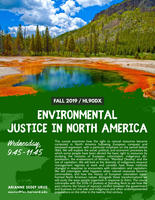Semester:
Offered:
Instructor: Arianne Sedef Urus
Meeting time: Wednesday, 9:45 - 11:45
 This course examines how the right to natural resources became contested in North America following European conquest and westward expansion, with a particular emphasis on the period before 1865. Sometimes these contested resources have been clean air, soil, and water, while at other times they included fisheries, forests, agricultural fields, animal pastures, or oil. From when pilgrims first arrived at Plymouth Rock in 1620, race, class, and gender have been the determining factors in regulating resource access rights. We will explore the social, political, and economic processes by which some people have been denied the basic right to resources by studying the histories of European colonization, indigenous dispossession, the enslavement of Africans, “Manifest Destiny,” and the rise of capitalism. We will look at the diversity of indigenous resource management regimes at work across the continent, and consider how these methods changed in response to encounters with colonialism and capitalism. We will interrogate what happens when natural resources become capitalist commodities, and how the history of European colonialism heralded the transformation of North American nature—a process which produced such contradictions as the beauty of Yellowstone National Park and the carnage of the Cuyahoga River which famously caught on fire in downtown Cleveland in 1969. Throughout the semester alongside these transformations we will study the ways people organized in response to them. The course culminates with the 2016-17 protests at Standing Rock to ask how the past informs the future of resource conflict between the government and business on one side and indigenous and other underrepresented populations on the other in the twenty-first century.
This course examines how the right to natural resources became contested in North America following European conquest and westward expansion, with a particular emphasis on the period before 1865. Sometimes these contested resources have been clean air, soil, and water, while at other times they included fisheries, forests, agricultural fields, animal pastures, or oil. From when pilgrims first arrived at Plymouth Rock in 1620, race, class, and gender have been the determining factors in regulating resource access rights. We will explore the social, political, and economic processes by which some people have been denied the basic right to resources by studying the histories of European colonization, indigenous dispossession, the enslavement of Africans, “Manifest Destiny,” and the rise of capitalism. We will look at the diversity of indigenous resource management regimes at work across the continent, and consider how these methods changed in response to encounters with colonialism and capitalism. We will interrogate what happens when natural resources become capitalist commodities, and how the history of European colonialism heralded the transformation of North American nature—a process which produced such contradictions as the beauty of Yellowstone National Park and the carnage of the Cuyahoga River which famously caught on fire in downtown Cleveland in 1969. Throughout the semester alongside these transformations we will study the ways people organized in response to them. The course culminates with the 2016-17 protests at Standing Rock to ask how the past informs the future of resource conflict between the government and business on one side and indigenous and other underrepresented populations on the other in the twenty-first century.
